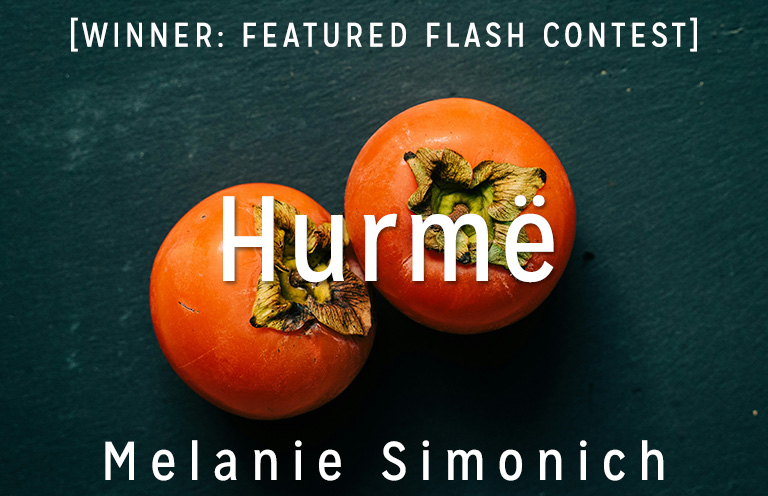We’re proud to share our final winner in this year’s Featured Flash Contest: “Hurmë” by Melanie Simonich! “There is a fine balance between ripe and rot with persimmons,” our narrator explains. There’s a fine balance, too, in the situation she navigates through this short piece, visiting her father in a foreign country. Congratulations to Melanie for winning this year’s contest, and be sure to check back on Friday for our interview with the winner!

When I arrive in Albania to visit my father and am shown my room in an apartment a mile from his own, his wife hands me a plastic bag filled with fruit. “Hurmë,” she says. “Gorgeous.” She does not warn me about their tartness or how eating too many at once can cause bezoars, she simply places them in my arms as an offering. I nod, ask, “How do you say thank you?” She tells me again but I don’t remember, let her thank you be my thank you. I do not know how to eat this fruit, don’t even really know what they are, warm in my arms, until I sit there awhile, alone in an apartment that is not my apartment, cradling their soft skins through the splitting bag and remember the word. Persimmon. I’ve never held a persimmon, never eaten one, mistake them often for tomatoes glancing around the grocery store. I place the bag on the counter, forget about them for a week, only remember when the fruit flies announce the rotting juices covering the floor. How do I say thank you here? I try but I do not remember.
* * *
On my first trip to Albania ten years before this one, my father took me to where the Adriatic meets the Ionian Sea. The Ionian is saltier. You can smell it in the air like he promised. He does not usually make promises. He cannot usually keep them. The torpedoes my father came here to dismantle sent clouds of C4 up along the peninsula that stretches towards Italy. Arcing his arm along the coast’s path to show me where, he said, “See? Just build a shelf, light them up, and there you go.” The sun glinted off his nail beds as he pointed, its reflection flaring tiny fires at the tips of his stunted fingers. “You burn them out,” he continued. “Other companies pitched splitting them in half, spraying them down but then you have the added expense of having to clean all that up. We said, ‘No, just burn them out. Force the core to collapse.’”
* * *
There is a fine balance between ripe and rot with persimmons. The ready fruit apparently goes translucent, its gone-gold skin revealing glimpses of its soft middle, the shape of the fruit itself drooping a little as if it were a globe and Atlas’s shoulders shift its horizon from below. It’s beautiful, that eerie inside-out glow, a ghost fruit whispering from inside itself. But after a while the skin gets so thin it splits and everything inside comes spilling out. By the time it appears ripe you may pick it up only to have it burst in your hands, juice gone tannin again stretching into puddles that congeal and stick to fruit flies’ tiny hairs. That’s what the housekeeper found when she came to clean the apartment a week into my visit. “Hurmë,” she said, rounding the corner into the bedroom holding the floppy skin. “You no care?” “Më fal,” I say quickly, unsure where the words have been hiding, unsure why I chose to beg instead of declare. Forgive me. They are words I only know from longing to hear them. She shrugs, wipes the juice from one gloved hand to the other.
* * *
“Force the core to collapse.” Maybe you build a girl the same way you rebuild a country.
* * *
It is an easy metaphor, this bomb my father set off at home and elsewhere, how he didn’t clean anything up, left a trail of debris behind him, is working now to do better, not for us, for this landscape, these people. But I am not trying to show you that. I am trying to tell you something about what we take, how that becomes what we end up giving. And I am trying to be mindful of the things I let myself carry lest I hand them off to someone I love.
* * *
At the end of the trip, we visit a farm at the base of a hill twenty-two miles from Gërdec where, eight years before, an entire munitions facility blew, killing twenty-six people. A persimmon tree sits at the top, its fruit rounding from pale yellow to light orange. Its leaves hushing in the wind, a soft shushing that matches the way the rocks greet the Erzen River’s rapids a mile away. And, eight years ago, when we still believed my father was coming home, this tree on a hill, its fruit rounding in the sun, morning dew still slicking the smooth skin of each curve, shook violently. Just once. Just enough to drop maybe one persimmon. Perhaps just enough for its leaves to make a shushing sound the rabbits perked up to notice, then carry on. I wonder what gets in a country’s land, how the ground absorbs the shock of its people. And, how, in that moment years ago, explosives tore skin like the soft splitting of persimmons as they hit the ground, the rabbits carried on rooting in the thistle and the river kept on hushing, and the land? It took what its people gave in the same way they still come for its own offering. A shudder. A small shake. A pale persimmon dancing in a breeze the world tucked tightly into a landmine eighty years ago before anyone knew what kind of place they were building. And unbuilding. And now, I am standing twenty-two miles away considering the shape the air makes as it moves around us. How a body might be flown up and through it, maybe even twirl, the low sun lighting up cheekbone, then jawline, then the back of a skull half gone and glinting. I am only here because my father is here. And it is years after that tragedy and no one talks about it except to say, perhaps on the drive to Durres, “Look, there are the craters, one, two, three.” This is not my country, and these are not my people, and it has taken me a long time to understand you do not have to say thank you for the unwanted things people put in your arms. So, I stand quiet, staring up at a persimmon tree as my father’s seven-year-old daughter reaches from his shoulders to pick a just ripe one, its rosy insides dripping down her face as he sets her on the ground. And the ground, to my constant amazement, holds her up, holds all of us up.
 Melanie Simonich lives in Virginia where she’s currently working on writing longer things, including a collection of linked essays, and avoiding the humidity.
Melanie Simonich lives in Virginia where she’s currently working on writing longer things, including a collection of linked essays, and avoiding the humidity.
